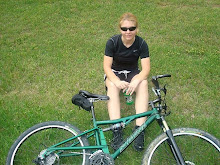I guess I don't see it.
We've been "talking"--if that's what the online back-and-forthing can rightly be termed--about the bounds of DA and whether or not they cross with SCIENCE! (cue Thomas Dolby.) I didn't participate much in the discussion because the scrolling ticker in my head flashed "So what? Big fat deal. What's so great about long-held and politically powerful communities of practice anyway?"
You see, I'm not normally combative.
What came to mind was Anne Ruggles Gere's introduction to Into the Field: Sites of Composition Studies. She foregoes the typical "let's fill the gap left by edu psych/psych/etc." metaphor to suggest that Composition Studies (of which some are DA based) is more of a "restructuring" of methods and concepts from other disciplines, not a stopgap.
Gere writes, "The bridge-building metaphor, which has served composition for several decades, can be used to describe much of the history of composition studies. One early intellectual association, between composition and educational psychology, accurately demonstrates composition's unproblemitized adoption of methods and values from another field." Gere suggests "deconstructing received boundaries" to "accommodate a more complicated relation, one that refigures both educational practices and scholarly research" (3-4). Well, so what? What's this blah blah posturing of Composition Studies (of which, I reassert, some are DA based) as a restructuring, not a linking between more "reputable" disciplines mean for us in class?
I'll tell you what:
1. Gere suggests--and I agree--that to call for disciplinary relevance vis a vis established methods and concepts often results in reductive and/or incomplete methods and concepts. BECAUSE THEY ARE OFTEN INCOMPATIBLE SYSTEMS.
2. Therefore, I propose that disciplinary quibbles and whether or not DA (or Composition Studies) "count" as Big-S-Science serve to highlight only the differences between the two paradigms while eliding the commonalities. As such, I'm not sure debating the definition(s) of Science (which are both rarefied and hegemonic) any further is the best course for getting us really debating the intricacies of DA as a method and product of inquiry. After all, if we're so busy clamoring for disciplinary credibility (through our affinity, however scarce, to SCIENCE!!!), we lose sight of the rich methods and methodologies of the field. (And I understand that the word "field" used here, in this way, is ideologically laden, but I'll leave it for now. Maybe we can back-and-forth about it post-prospectus-defense.)
3. Therefore again, I propose that we assume that DA is a Science in its own right, as defined by practitioners in the field (a process very much like the Scientific Revolution, a process of trial and error, disciplinary best-practices establishment, failure, success, etc.) based on its rigor, adherence to common method, and other factors which I cannot recall but should be able to.
**Sigh**
Long post. More later and less obnoxiously.
15 September 2009
Subscribe to:
Post Comments (Atom)

6 comments:
Unimportant and Unimpressive? Really?!?
I don't see either of those words in this post. I'm confused.
Maybe I'm just not picking up on the subtext, or maybe I'm just that tired.
More words, plz.
Casie - you have a great point and I tend to agree with you. Lots of people writing in the qualitative research area would like us to abandon this "defensive" stance, too.
The main problem is money. (I think RTB may have touched on this in his post.) Education wants to be a social science and increasingly needs external funding to support human subjects research on larger scales. The only way to get this $$ is to position ourselves as a "science." The issues here about why science matters are related to academia - landing a job, getting grants, being promoted & tenured - and so are to some extent outside the focus of this class, yet of concern to people who want to be academics in a social science field and who will need to justify their methods as being "science." Or, hopefully, are truly curious and have never thought before about defining what science means or deconstructing some of these terms before deciding whether we "are" or "aren't."
Why can't we (those of us doing DA in education) propose to be something different? Something better? To some extent because we are scared and easily cowed and listen to those with power and authority and find it easier to do what people tell us (be a science!) rather than buck the system and say to heck with it. Though many of us would like to say that...in essence we're playing a discourse game. Say the right words, frame it write, spin the proposal in the right way, and voila! science! funding!
I tried to point out in class last week that it was interesting that we chose to build the case that "Yes! It is a science!" when we could just as easily have chosen to argue, "No! It's not a science!" The choice is ours, but there are very real (money, consequences, etc.) reasons behind the choice..
Thinking about what we REALLY care about, what we REALLY want to do with our work, and what our REAL passions and beliefs are can get lost in this struggle for resources. That's what is truly sad to me.
I think you've identified what's been rankling me about our discussion: that the passions and beliefs get sold for the sake of definition.
More on this thought later. I'm going to be late for class. Eeeep!
Okay, now that I have some distance from the discussion, I think I can talk about it more completely:
I'm stuck in a bind where I have to keep proving that DA (and qual, for that matter) ISN'T a science, because I'm writing an Humanities dissertation.
Hm.
Oh!! Now isn't that interesting...what a great example of exactly what we're talking about!
Post a Comment